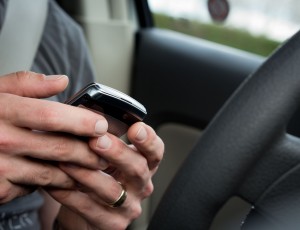
Minnesota police will begin a distracted driving crackdown this week to cut down on the number of drivers who send and receive text messages while behind the wheel.
The distracted driving patrol will begin today and run through April 18, and you can expect a ticket if you’re stopped by police. Tickets for distracted driving vary by county, but they are typically between $125-$145.
State Patrol Lt. Tiffany Nelson outlined a few driver maneuvers that cops will be keeping an eye out for this week.
- Varying speed
- Swerving and lane drifting
- Looking down
Nelson said these are clear signs that a driver isn’t paying attention to the road.
“Those are the drivers we’re going to be looking for and issuing citations (to) if we believe that distraction was occurring in that vehicle,” Nielson said during a news conference. “The potential is there for a deadly crash when the phone is being used while operating a vehicle. Is sending a message more valuable than the life of the person next to you?”
According to the Minnesota Department of Public Safety, about 25 percent of all traffic accidents are caused by distracted drivers. Distracted driving resulted in 56 deaths, 165 serious injuries and 16,900 accidents in Minnesota alone in 2014, but Lt. Nelson believes “that it’s underreported.”
Tough to Prove
Lt. Nelson said Minnesota only handed out 3,200 texting while driving citations in 2014, mainly because it’s hard for an officer to prove that the driver was texting or tweeting. That said, police can still ticket you for a traffic violation you committed while you were distracted.
Although we certainly aren’t advocating that you text behind the wheel, it can be very difficult for an officer to prove that you were, in fact, texting or sending an email while driving. Most of the time cops can only prove you were texting if you admit to doing it or you surrender your phone to the cops, which you don’t need to do. If you are stopped and questioned about texting behind the wheel, do not admit to anything and politely tell the cops that you are expressing your 4th amendment rights to hold on to your phone.
Related source: Pioneer Press





